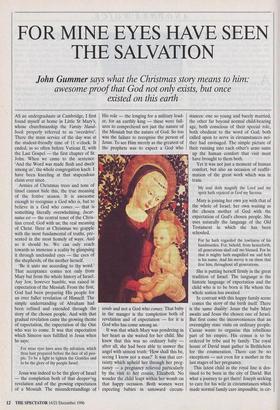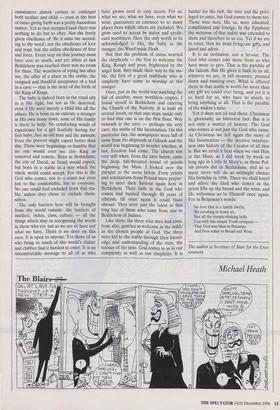FOR MINE EYES HAVE SEEN THE SALVATION
John Gummer says what the Christmas story means to him: awesome proof that God not only exists, but once existed on this earth
AS an undergraduate at Cambridge, I first found myself at home in Little St Mary's, whose churchmanship the Varsity Hand- book properly referred to as 'overdrive'. There the main service of the day was at the student-friendly time of 11 o'clock. It ended, as so often before Vatican II, with the Last Gospel — the first chapter of St John. When we came to the sentence 'And the Word was made flesh and dwelt among us', the whole congregation knelt. I have been kneeling at that stupendous claim ever since.
Armies of Christmas trees and tons of tinsel cannot hide this, the true meaning of the festive season. It is awesome enough to recognise a God who is, but to believe in a God who comes — that is something literally overwhelming. Incar- flatus est — the central tenet of the Chris- tian creed; God with us; the real meaning of Christ. Here at Christmas we grapple with the most fundamental of truths, pre- sented in the most homely of ways. And so it should be. We can only reach towards so immense a reality by glimpsing it through unclouded eyes — the eyes of the shepherds, of the mother herself.
'Be it unto me according to thy word.' That acceptance comes not only from Mary but from the whole history of Israel. Any Jew, however humble, was raised in expectation of the Messiah. From the first, God had been preparing His people for an ever fuller revelation of Himself. The simple understanding of Abraham had been refined and extended through the story of the chosen people. And with that gradual revelation came the growing theme of expectation, the expectation of the One who was to come. It was that expectation which Simeon sees fulfilled in Jesus when he says:
For mine eyes have seen thy salvation, which thou hast prepared before the face of all peo- ple. To be a light to lighten the Gentiles and to be the glory of thy people Israel.
Jesus was indeed to be the glory of Israel — the completion both of that deeper:fig revelation and of the growing expectation of a Messiah. The misunderstandings of His role — the longing for a military lead- er, for an earthly king — these were fail- ures to comprehend not just the nature of the Messiah but the nature of God. So too was the failure to recognise the person of Jesus. To see Him merely as the greatest of the prophets was to expect a God who sends and not a God who comes. That baby in the manger is the completion both of revelation and of expectation — for it is God who has come among us.
It was that which Mary was pondering in her heart as she waited for her child. She knew that this was no ordinary baby — after all, she had been able to answer the angel with utmost truth: 'How shall this be, seeing I know not a man?' It was that cer- tainty which upheld her through her preg- nancy — a pregnancy relieved particularly by the visit to her cousin, Elizabeth. No wonder the child leapt within her womb on that happy occasion. Both women were expecting babies in untoward circum- stances: one so young and barely married, the other far beyond normal child-bearing age, both conscious of their special role, both obedient to the word of God, both called upon to serve in circumstances nei- ther had envisaged. The simple picture of their running into each other's arms sums up the human comfort that visit must have brought to them both.
Yet it was not just a moment of human comfort, but also an occasion of reaffir- mation of the great work which was in train.
My soul doth magnify the Lord and my spirit hath rejoiced in God my Saviour.
Mary is joining her own joy with that of the whole of Israel, her own waiting as the chosen mother of God with the expectation of God's chosen people. She uses naturally the language of the Old Testament in which she has been schooled.
For he hath regarded the lowliness of his handmaiden. For, behold, from henceforth, all generations shall call mc blessed. For he that is mighty hath magnified me and holy is his name. And his mercy is on them that fear him, throughout all generations.
She is putting herself firmly in the great tradition of Israel. The language is the historic language of expectation and the child who is to be born is He whom the whole nation has awaited.
In contrast with this happy family scene comes the story of the birth itself. There is the same duality: Jesus the baby Mary awaits and Jesus the chosen one of Israel. But first come the inconveniences that an overmighty state visits on ordinary people. Caesar wants to organise this rebellious part of his empire. His census is to be ordered by tribe and by family. The royal house of David must gather in Bethlehem for the enumeration. There can be no exceptions — not even for a mother in the last stages of her pregnancy.
This latest child in the royal line is des- tined to be born in the city of David. But what a journey to get there! Joseph seeking to care for his wife in circumstances which made normal family care impossible, in cir- cumstances almost certain to endanger both mother and child — even at the best of times giving birth was a pretty hazardous matter. Yet in that occupied land there was nothing to do but to obey. Not the freely given obedience of 'Be it unto me accord- ing to thy word', not the obedience of love and trust, but the sullen obedience of fear and force. Every step on that journey must have cost so much, and yet when at last Bethlehem was reached there was no room for them. The weariness of trying inn after inn, the offer of a place in the stable, the resigned and thankful acceptance of a bed in a cave — that is the story of the birth of the King of Kings.
The baby is indeed born in the royal city as is His right, but not as He deserved, even if He were merely a child like all the others. He is born as an outcast, a stranger in His own home town, none of His family is there to help. No comforting words of experience for a girl fearfully having her first baby. Just an old man and the animals. Even the poorest might expect better than this. These were beginnings so humble that no one would ever see this King as removed and remote. Born in Bethlehem, the city of David, as Israel would expect, but born in a stable in a way which the whole world could accept. For this is the God who comes, not to a court nor even just to the comfortable, but to everyone. No one could feel excluded from that sta- ble, unless they chose to exclude them- selves.
The only barriers here will be brought from the world outside: the barriers of intellect, riches, class, culture — all the things which stop us recognising the worth in those who are not as we are or have not what we have. There is no door on this cave. It is open to anyone. Yet those of us who bring so much of this world's clutter and clobber find it hardest to enter. It is an uncomfortable message to all of us who have grown used to easy access. For us, what we are, what we have, even what we wear, guarantees us entrance to so many places from which others are excluded. We grow used to access by status and credit- card worthiness. Here the only worth to be acknowledged is His, the baby in the manger, the Word made Flesh.
Not that the problem of status worried the shepherds — the first to welcome the King. Rough and poor, frightened by the angel host, they made their way to the sta- ble, the first of a great multitude who in simplicity have come to worship at this manger.
Once, just as the world was watching the fall of another, more worthless empire, I found myself in Bethlehem and entering the Church of the Nativity. It is built on several levels, so that one steps inside only to find that one is on the first floor. Way beneath is the cave — perhaps the very cave, the stable of the Incarnation. On this particular day, the newspapers were full of news from the shipyards at Gdansk and the world was beginning to wonder whether, at last, freedom had come. The church was very still when, from the cave below, came the deep, full-throated sound of priests beginning the Mass. I looked over the parapet to the scene below. Forty priests and seminarians from-Poland were prepar- ing to meet their Saviour again here in Bethlehem. Their faith in the God who comes had burned through 40 years of atheism, till once again it could blaze abroad. They were just the latest in that long line of those who came from afar to Bethlehem of Judaea.
Like them, the three wise men had come from afar, gentiles as welcome in the stable as the chosen people of God. The three were led to the stable through their knowl- edge and understanding of the stars, the science of the time. God comes to us in our complexity as well as our simplicity. It is harder for the rich, the wise and the privi- leged to enter, but God comes to them too. Those wise men, like us, were educated, complicated and foreign. In the Epiphany the welcome of that stable was extended to them and therefore to us too. Yet if we are to enter, then we must bring our gifts, and kneel and adore.
It is an invitation, not a let-out. The God who comes asks more from us who have more to give. That is the parable of the talents. But He gives it back to us all, whoever we are, in full measure, pressed down and running over. What is offered there in that stable is worth far more than any gift we could ever bring, and yet it is so hard for us, who have so much, to bring anything at all. That is the parable of the widow's mite.
Yet it does not all end there. Christmas is, gloriously, an historical fact. But it is not only a matter of history. The God who comes is not just the God who came. At Christmas we tell again the story of His Incarnation — the decisive interven- tion into history of the Creator of all that is. But we retell it best when we visit Him at the Mass, as I did week by week so long ago in Little St Mary's, as those Pol- ish priests did in Bethlehem, and as so many more will do as midnight chimes His birthday in 1996. There we shall kneel and adore the God who comes as the priest lifts up the bread and the wine, and He welcomes us to Himself once again. For in Betjeman's words:
No love that in a family dwells, No carolling in frosty air, Nor all the steeple-shaking bells Can with this simple Truth compare — That God was Man in Palestine And lives today in Bread and Wine.
The author is Secretary of State for the Envi- ronment.



















































































































 Previous page
Previous page